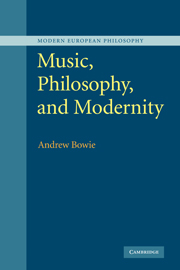Book contents
- Frontmatter
- Contents
- Preface
- Introduction
- 1 Form, feeling, metaphysics, and music
- 2 Music, language, and the origins of modernity
- 3 Rhythm and Romanticism
- 4 Hegel, philosophy and music
- 5 Music and the subjects of Romanticism
- 6 Music, freedom, and the critique of metaphysics
- 7 Pro and contra Wagner
- 8 Music, language, and being: Wittgenstein and Heidegger
- 9 Adorno: musical philosophy or philosophical music?
- Conclusion
- References
- Index
5 - Music and the subjects of Romanticism
Published online by Cambridge University Press: 15 October 2009
- Frontmatter
- Contents
- Preface
- Introduction
- 1 Form, feeling, metaphysics, and music
- 2 Music, language, and the origins of modernity
- 3 Rhythm and Romanticism
- 4 Hegel, philosophy and music
- 5 Music and the subjects of Romanticism
- 6 Music, freedom, and the critique of metaphysics
- 7 Pro and contra Wagner
- 8 Music, language, and being: Wittgenstein and Heidegger
- 9 Adorno: musical philosophy or philosophical music?
- Conclusion
- References
- Index
Summary
The task of philosophy
In early German Romantic philosophy communication and understanding are often regarded more as ways of acting and being in the world than as forms of representation of a pre-given reality. Music becomes particularly significant because it involves norm-based interpretation, on the part both of players and of listeners, and yet resists wholesale incorporation into representational and theoretical discourse. The question is what this means for philosophy. The interrogation of the nature of philosophy occasioned by the changes in thinking about language in Romanticism need not imply that, because modern philosophy fails to achieve some of the tasks it sets itself, it is therefore at an end, in the way the later Heidegger claims by his equation of philosophy and metaphysics. Such an implication would contradict the pragmatist side of Romanticism, which assesses discourses and practices in terms of their contribution to human flourishing, and so abstains from final judgements on the status of particular cultural practices. There is, however, no doubt that a significant strand of modern philosophy, from the Romantics, to Nietzsche, Wittgenstein, Heidegger, Adorno, Merleau-Ponty, and Gadamer, can be interpreted as questioning the assumptions of science-oriented philosophy in terms of the issues that we have been exploring via music.
Ernst Tugendhat has criticised this strand of philosophy as follows: ‘it is characteristic for the entire tradition of philosophical Romanticism from Schelling and Hegel to Heidegger and Gadamer that, in ever new ways, an ontologically inflated conception of art became a substitute for the question of the justification of norms, and it was in every instance an obfuscation of the concept of truth’ (Tugendhat 1992: 430).
- Type
- Chapter
- Information
- Music, Philosophy, and Modernity , pp. 138 - 165Publisher: Cambridge University PressPrint publication year: 2007

